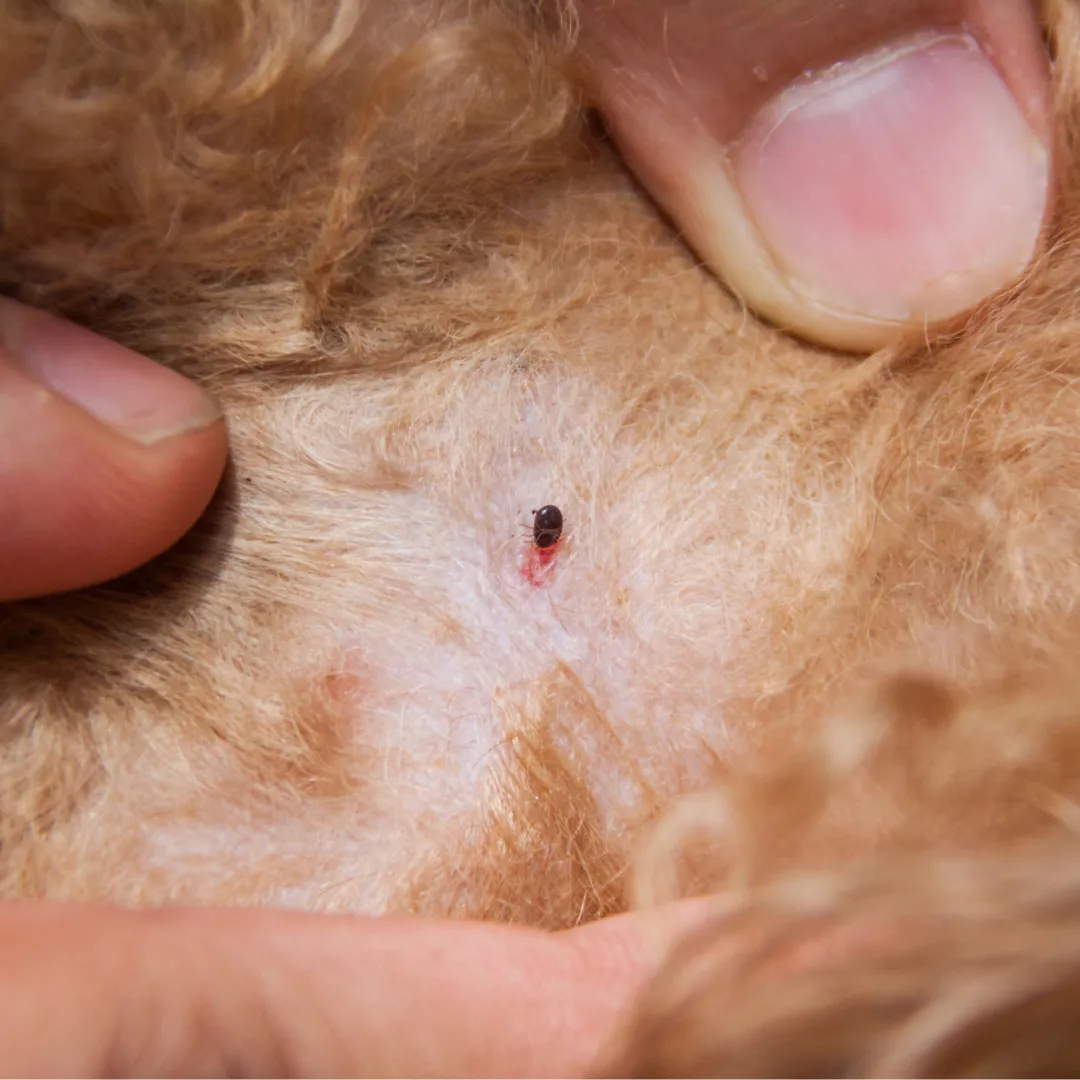Fleas are a persistent nuisance, often terrorizing our beloved canine companions and sending dog owners frequently to the vet. These tiny parasites reproduce rapidly and expertly hide in every nook and cranny both inside and outside our homes. The moment they come into contact with a dog, they quickly attach themselves and feed on the dog’s blood, leading to discomfort and potential health issues. While numerous flea treatments are available, many contain chemicals that could be harmful to your dog or the environment. This article will explore the most effective natural solutions and Home Remedies To Prevent Fleas On Dogs, ensuring you and your pet can enjoy a flea-free environment. For more information on preventing common parasites, consider reading about flea and worm treatment for dogs monthly.
Recognizing a Flea Infestation on Your Dog
Flea bites can cause significant irritation and excessive itching. If you observe your dog scratching more than usual, developing bumps on their skin, or experiencing noticeable hair loss, there’s a strong possibility that fleas are present. Flea allergy dermatitis is a common condition among pets, triggered by an allergic reaction to flea saliva. Beyond irritation, a severe infestation can lead to anemia, particularly in puppies or small dogs, due to significant blood loss. Furthermore, if dogs ingest fleas while grooming, they can contract tapeworms. Bartonellosis, an infection caused by Bartonella bacteria, has also been linked to fleas, potentially causing symptoms such as nausea, fever, an irregular heartbeat, and a loss of appetite in affected dogs. If you’re wondering if your dog itching all the time not fleas, it’s worth exploring other potential causes.
Fleas typically thrive in warm, humid conditions, preferring temperatures between 70–85°F (21–29°C) and around 70% humidity, as noted by PetMD. These conditions explain why certain regions experience year-round flea problems. Interestingly, fleas dislike direct sun exposure, a fact that can be strategically used in preventative measures against these resilient parasites. In 2012, data from the Banfield Pet Hospital in Birmingham indicated that states like Alabama, Florida, Georgia, Louisiana, Oregon, South Carolina, Texas, and Washington were among the most flea-infested regions in the U.S., experiencing flea activity throughout the year. Conversely, drier states such as Arizona and Utah generally report fewer flea issues.
Natural Flea Remedies for Dogs
The good news is that there are several effective ways to combat fleas without resorting to harsh chemicals. From soothing baths and revitalizing dips to topical rubs and protective collars, a variety of home remedies to prevent fleas on dogs are available for every canine temperament. These natural approaches focus on creating an environment that fleas find inhospitable, using ingredients that are generally safe and beneficial for your pet.
Apple Cider Vinegar
Apple cider vinegar stands out as a top natural remedy for fleas on dogs, offering an effective solution that doesn’t always require a full bath. Fleas are averse to acidic environments, and apple cider vinegar’s acidity helps to balance the pH levels on your dog’s skin and fur. This creates an unbearable environment for fleas while having little to no adverse effect on your dog.
You can utilize apple cider vinegar as a homemade flea spray for dogs or incorporate it into their drinking water. To prepare the spray, mix six cups of apple cider vinegar with four cups of water, add a pinch of sea salt, and then pour the solution into a spray bottle. Shake it well before use and spray the mixture thoroughly over your dog’s coat, being careful to avoid the eye area. Alternatively, adding a couple of spoons of apple cider vinegar (or any other vinegar) to your dog’s drinking water can help eliminate any fleas that have been ingested. Always introduce a small amount of vinegar first to ensure your dog doesn’t become discouraged from drinking water.
Lemon Power
Similar to apple cider vinegar, lemon is another powerful natural flea remedy for dogs. This highly acidic fruit is beneficial for your dog while being detrimental to fleas. Lemons are easily accessible, simple to use, and impart a refreshing, citrusy aroma to your dog’s coat, making it a pleasant experience for both you and your pet.
To create a lemon bath, combine half a cup of freshly squeezed lemon juice with two cups of water. Add this mixture to your dog’s regular bath, then wash your canine friend with your usual natural pet soap or shampoo. For a simpler application, dip your dog’s comb in lemon juice and brush through their fur. If your dog has very short hair or is hairless, you can use a cloth soaked in the lemon juice mixture to wipe them down, achieving the same repellent effect. Another resourceful use for lemon is to boil thin lemon slices, allow the mixture to cool overnight, and then spray it over soft furnishings in your home to deter fleas. This makes an excellent homemade flea spray to keep on hand for both your dogs and your living space.
 Close-up of a flea on a dog's fur, highlighting the tiny parasite
Close-up of a flea on a dog's fur, highlighting the tiny parasite
Essential Oils
Essential oils have become widely popular among humans, and their efficacy extends to our furry friends as well. A range of essential oils can effectively repel fleas, with some even potent enough to kill them. However, due to their potency, essential oils can be dangerous if used directly or ingested by dogs. Therefore, it is crucial to always dilute them with a carrier oil like coconut oil, avocado oil, or another preferred carrier oil. You can also dilute them with water in a glass container and shake well before each use. Never add essential oils to your dog’s drinking water.
Effective essential oil repellents include lavender essential oil, rose geranium essential oil, lemongrass, and rosemary essential oil. Add a few drops of any of these to your dog’s natural shampoo or mix with water and a carrier oil in a glass spray bottle. Spray this mixture on the back of your dog’s neck, taking care to avoid contact with their eyes or ears. It is important to apply the mixture in an area your dog cannot easily lick, as ingesting some essential oils can lead to stomach upset or, in some cases, toxicity. Remember, a little goes a long way with these potent oils. For those considering a holistic approach to their dog’s health, understanding the best options for best worm flea and tick treatment for dogs is key.
You can also create a lavender or cedar oil collar by dipping your dog’s collar (whether homemade or store-bought) in water containing a few drops of the chosen essential oil. Allow the collar to dry completely before placing it back on your dog, providing a continuous, mild repellent effect.
Coconut Oil and Multi-purpose Neem Oil
Continuing with the subject of oils, rubbing coconut oil all over your dog can repel fleas while also giving their coat a shiny, luxurious finish. Unlike essential oils, coconut oil is safe for ingestion. You can safely add some to your pet’s food, as it offers antibacterial benefits when consumed.
Another excellent option is neem oil. Mix it with water and spray it on affected areas to help reduce itchiness and repel fleas. Neem oil is also non-toxic if ingested, although its bitter taste often deters dogs from liking it too much. This makes it a great choice for topical application, providing relief without concern for accidental consumption.
Baths and Dips
For dogs who enjoy a good splash, baths and dips are highly effective methods for flea treatment. You can use organic soaps and natural shampoos to thoroughly cleanse your dog. Adding a few drops of essential oil to the shampoo or bath water can provide an extra flea-repellent boost, enhancing the treatment. If you’re concerned about your dog’s overall health, researching the best flea and worm treatment for dogs can provide valuable insights.
A delightful and effective rosemary dip can be prepared by soaking rosemary leaves in boiling water for several minutes. Strain the liquid and dilute it with warm water until the temperature is comfortably warm, not scalding. Allow your dog to splash around in this treatment. It’s a fun and natural way to treat your dog for fleas, but ensure your pup doesn’t drink the dip. This natural approach supports holistic pet care.
Flea Prevention in the Environment
Treating your dog for fleas is only half the battle. If your dog has fleas, it’s highly probable that your home and yard have also become prime breeding grounds. Implementing environmental flea prevention methods using natural approaches is crucial to breaking the flea life cycle and preventing re-infestation. Addressing fleas in your home and yard creates a comprehensive defense, ensuring lasting relief for your pet.
Flea Trap
A simple and effective method for getting rid of fleas indoors is a homemade flea trap. Just add a small amount of dishwashing soap to a shallow bowl of warm water and place it on the floor overnight, preferably in an area where your dog frequently rests. The mixture creates a sticky, highly viscous surface that traps fleas. In the morning, simply dispose of the water and thoroughly wash the bowl. Repeat this nightly until no more fleas are found in the trap.
Diatomaceous Earth
Diatomaceous earth, a fine white powdery substance extracted from the fossilized remains of algae, is an amazing natural flea treatment for both dogs and their environment. Sprinkle an even layer of food-grade diatomaceous earth on your carpets and floors, paying special attention to areas your dog frequents. Leave it undisturbed for about 48 hours (blocking off the area if possible), then vacuum it up thoroughly. Diatomaceous earth works by dehydrating flea eggs and larvae, thereby preventing another infestation. This natural flea and tick treatment is an indispensable step when dealing with an infestation.
Steam Cleaning
Water-based vacuums and steam cleaners are excellent tools for flea prevention. Steam cleaning effectively drowns adult fleas and flushes out dust, dirt, and flea eggs from carpets and upholstery. This method not only helps prevent re-infestation but also leaves your home smelling fresh and looking clean, creating a healthy, flea-free environment. This chemical-free approach is safe for homes with pets and children.
 Various natural ingredients and tools used for effective flea prevention and treatment
Various natural ingredients and tools used for effective flea prevention and treatment
Clear Yard and Flea-Repellent Plants
Your yard can easily become a breeding ground for fleas if it’s not well-maintained. To prevent outdoor flea infestations, regularly clear out any dead plants, leaves, and weeds from your grass and garden beds. Additionally, research which flea-repellent plants thrive in your local area and plant them strategically around your yard. Examples of such plants include lavender, spearmint, and lemongrass, which emit scents that fleas dislike. A well-maintained and planted yard significantly reduces outdoor flea populations.
Sunshine
Fleas are highly sensitive to light and prefer dark, shaded areas. Maximize the amount of natural sunshine entering your home by opening curtains and blinds, especially in areas where fleas might hide. Outdoors, clearing out dead plants and debris allows sunlight to reach the ground, making it very difficult for fleas to conceal themselves and thrive in your grass and garden. Utilizing sunlight is a simple, effective, and free way to deter fleas both inside and outside your home. While natural remedies are great, knowing can you get ear mites from dogs is also important for comprehensive pet health.
There are many more natural home remedies to prevent fleas on dogs available. As these remedies do not rely on heavy chemicals, they typically take a little longer to show full results compared to conventional chemical sprays. For dogs that exhibit severe allergic reactions to flea bites, stronger chemical treatments might be necessary. However, for most dogs, these natural flea treatments offer an effective and safer alternative for maintaining a flea-free life.
